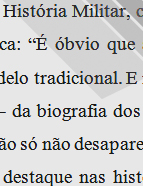

................................
In the early 19th century, the discipline of history began to acquire greater erudition, while also embracing a sense of modernity and sociopolitical engagement. This development maintained a dynamic of emulation with the other sciences, although such progress did not always occur in Portugal: " Just as political and military events do not occur in isolation, they cannot be studied in isolation either . Nevertheless, Portuguese military history has been produced in complete detachment from social, economic, and cultural events. The only connections sought by military historians are with political events (of which military events are considered a consequence) and, to a lesser extent, with the technical aspects of warfare. Moreover, as previously noted, there is no doubt that many economic or cultural historians behave in the same way towards political and military history, which they are unfamiliar with . If military history continues on its course in ‘splendid’ isolation, the same can be said of economic or cultural history, whose isolation has been no less ‘splendid’” (Macedo, O Bloqueio Continental… [The Continental Blockade…], 1990, pp. 32–33).
Recalling the nationalist movements in Europe during the second half of the 19th century up to the First World War, it is evident that official historiographies played a regulatory role in legitimising the sociopolitical structures of nation-states. Obviously, various national historiographical trends coexisted, some even contrary to official discourses, as noted by Nuno Severiano Teixeira ( Teixeira , A História Militar… [Military History…], 1991), although the versions authorised by the public authorities prevailed. History supported the construction and reinforcement of state identities by transmitting traditional values, where war, military achievements, and heroes served as references for historical evolution and, in some cases, the founding myth of national identity—a categorical premise in Portuguese history, particularly concerning the figure of D. Afonso Henriques, for example.
This work is financed by national funds through FCT - Foundation for Science and Technology, I.P, in the scope of the projects UIDB/04311/2020 and UIDP/04311/2020.
